INVESTIGATION: Nurses turned cleaners — and other sour tales from hospitals raising quacks in Akwa Ibom
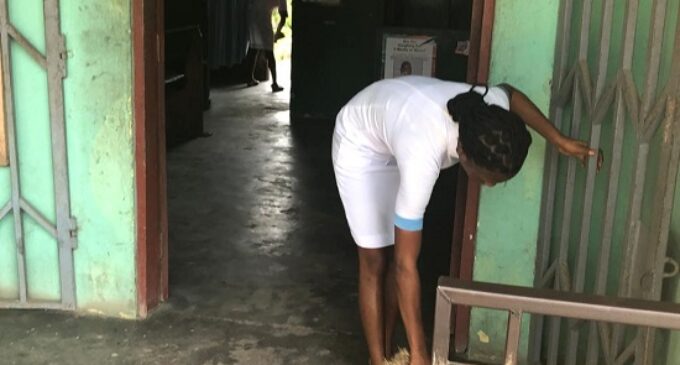
When Happiness aced her Senior School Certificate Examination (SSCE) in 2018, she was set for the next challenge: taking the Joint Admissions and Matriculation Board (JAMB) examination to study nursing, her dream course. But as the date for the exam drew nearer, it dawned on her that her family would be unable to afford her tuition in the university. So, she went for what seemed like a favourable alternative at Lifecare Clinics/Hospital, Uyo, Akwa Ibom state.
“I registered as an auxiliary nursing student here because of money issues. When I would have started school, my father did not plan for it and I was tired of staying in the house,” she told TheCable from the hospital’s security post during a visit.
“So, I said let me start this one for now so that before I go to school, I will have a little experience. If I go to school now, I will go and study theory, while here, they are doing practicals.”
She has been enrolled into the programme since March and while it offers her some of what she would have got in school — even the chance to attend to patients once in a while — she has also been getting much more than she bargained for, working in full shifts and doing almost everything a paid staff is employed to do at the hospital.
“We have three shifts — morning, afternoon and night — with up to six or seven students on each shift. You will work for days in a row and take one day off,” she said but added ruefully: “It can be stressful. There are times you come to work and you don’t even sit down for one second. You may be in the theatre, or they brought in an accident case, or they do an operation for appendix or CS (Cesarean section). If there is work that day, you will not sit down.”
Her chat with the reporter was interrupted by a horn blasting through the hospital’s entrance gate. With no security officer or gatekeeper within sight, Happiness, as she simply identified herself, ran off to open the gate, returning almost immediately after.
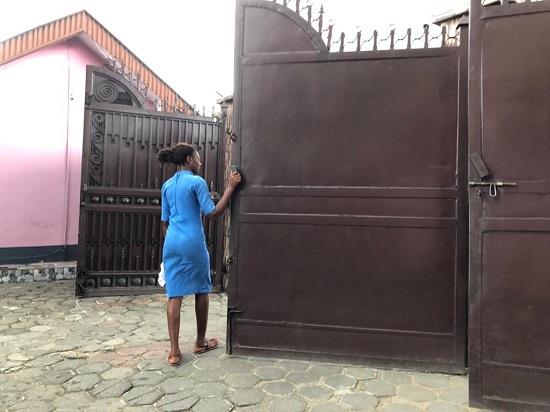
Happiness at the hospital gate
As if sensing the reporter’s confusion on why she was doing the work of the gatekeeper, she quickly explained that she was only helping out as the gatekeeper is not on duty, but most importantly, because the hospital rewards good behaviour by employing the student after graduation.
“Doctor is watching you, including all the nurses. Everybody is taking note of your character. When you finish, they will just give you your certificate and employ you. Those on white are staff, they were students here… they employed them to work because of their behaviour,” she said, pointing to some girls.
Like Happiness and about 20 other students currently enrolled in the hospital’s auxiliary programme, many others in her condition are struggling to be in the good books of the doctors and owners of hospitals in Akwa Ibom, even if this meant hard labour and exploitation.
Over the course of one month, TheCable investigated how, in running the auxiliary nursing programme which the Nursing and Midwifery Council of Nigeria (NMCN) said amounts to quackery, doctors and hospital owners exploit young people, mostly girls, who end up working so hard but earn so little.
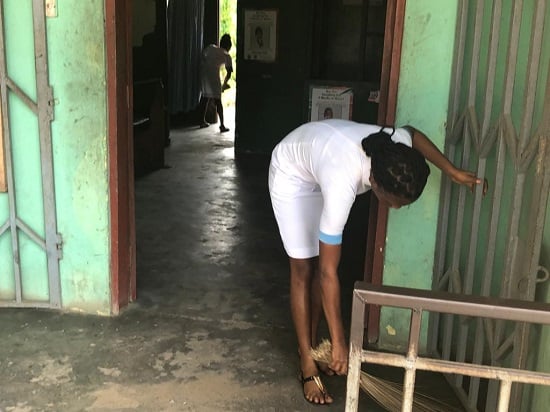
Nursing students sweeping Demak Clinic and Maternity, Ikot Ekpene
In six hospitals visited, auxiliary nurses spoke of how demanding their work is — even working more than staff nurses — and performing services such as cleaning and sweeping the hospital premises. When they eventually complete the programme, as is the case with their colleagues now working as nurses, they are issued certificates and offered cheap employment, sometimes as low as N13,000 a month.
Bonaventure Omeje, a registered nurse practising in Lagos state, explained that the trainees are tagged auxiliary nurses because the doctors seek to exploit them in various ways, including “such as washing the beddings, cleaning and washing the patient’s clothes and other petty jobs which should be the job of the potters”.
“Some also employ auxiliary nurses because they need less manpower so that they can use them as a jack of all trades. Some doctors believe if you can get somebody that can do all these things, why go for a registered nurse that can only attend to a patient and not do other things?” Omeje said.
Both the national leadership and Akwa Ibom state chapter of the Nigerian Medical Association (NMA) did not respond to inquiries on the matter.
‘THE HOSPITAL MATRON WHO WANTS THE MONEY WASTED’
While a good number of the students in hospitals visited were promised a standard training programme, featuring curriculum-based lectures, the story changes once they enrol. Some end up stranded and leaving before completion, while others who continue are left with no choice but to either learn from fellow students or in the course of treating patients.
Such experience is what plays out at Milestone Specialist Hospital in Uyo, which also runs the auxiliary programme despite collecting as much as N200,000 as tuition from trainees. Aniekan Ukpai, the hospital matron, was accused of not teaching students what they need to know, according to two nursing students who told TheCable she is “only interested in the money”.
Ukpai told the reporter that no lectures are offered and “it is left for you if you want to use something that you are going to use for practicals on your own”. This is despite allowing some of the students to manage patients sometimes without supervision.
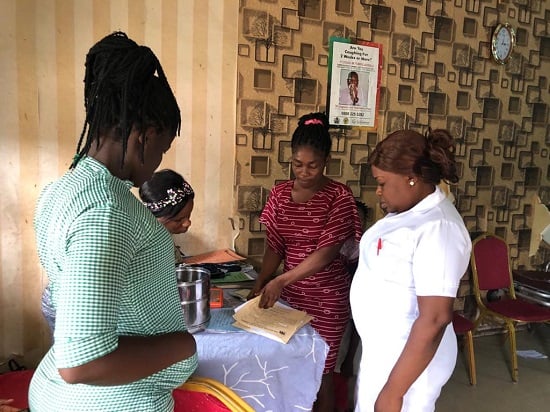
Aniekan Ukpai (middle), the hospital matron accused of refusing to teach nursing students.
The matron is often not willing to answer students’ enquiries about healthcare, according to some of the persons who spoke with TheCable. The students often seek knowledge from other nurses, who like them, passed through the programme and are practising with limited knowledge.
“All of us, since we came here, she (the matron) is not showing us anything. You can ask her something and she will say she does not know. She wants the money to be wasted,” a student who craved anonymity told TheCable.
“For me, it is one of the student nurses that taught me. Some other nurses do teach people but she does not. You will see it when she comes.”
Together with the nurses, the students work six hours on each shift but sometimes have to stay extra hours — with no compensation. One of the students said some of those they attend to at the hospital are referred from the University of Uyo Teaching Hospital (UUTH) where Solomon Udo, the owner of the hospital, works as a medical doctor.

An auxiliary nurse takes a break from work to eat
“We have plenty (of) patients here. They used to transfer some people from the teaching hospital (University Of Uyo Teaching Hospital) to here (the health facility) because our doctor is working there. There is work o, but the salary is not much,” she told this reporter.
‘N13,000 SALARY TO WORK AS A NURSE, CLEANER’
In private hospitals across Nigeria, the remuneration nurses get is so poor that a number of them have to work in at least two places to survive, according to nurses and doctors interviewed by TheCable. While hospitals in states such as Lagos and Abuja usually offer between N60,000 and N100,000 as monthly salary, other states pay as low as N30,000.
But even such meagre pay is, unfortunately, the life aspiration for most of the nursing trainees in the hospitals visited; they collect as little as N13,500 when employed after graduation.
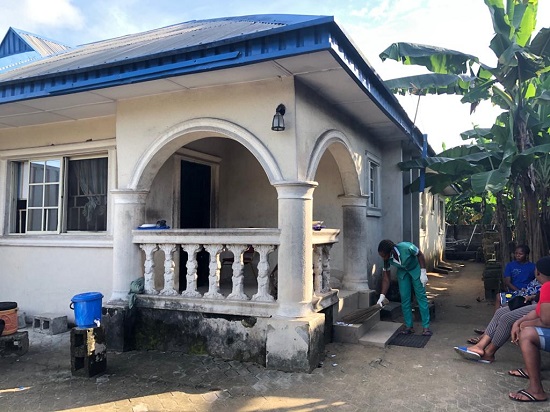
A nurse on duty sweeping the premises of Milestone Specialist Hospital
One of the nurses retained to practise after graduating from the trainee programme at Milestone Specialist Hospital is said to be collecting N13,500 as her monthly salary, while two in a similar situation at Lifecare Hospital are reportedly being paid N15,000.
Little wonder why one of them is bent on studying nursing in the university.
THE HOSPITAL WHERE NURSING STUDENTS RUN 12-HOUR SHIFT
At St. Mary’s Hospital at Urua Akpan, Essien Udim local government area, the auxiliary nursing programme is being run almost as if it is a normal school — with a boarding house, handouts for students and practicals in the wards!
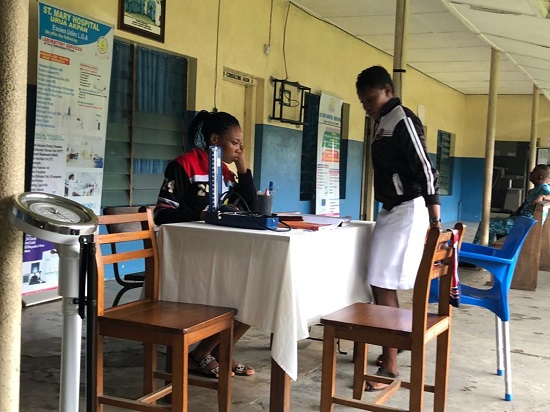
Nursing trainees on duty at St. Mary’s Hospital
A former nurse at the hospital told TheCable she had to resign because of the “lack of respect” they have for the nursing profession.
“The quackery at St. Mary’s Hospital, Urua Akpan, is alarming. I worked there but had to resign because they don’t have respect for the nursing profession,” the nurse said. “We were just two registered nurses, and we both resigned. I was asked to sweep, mop and weed (but) I refused.”
During visits to the hospital, TheCable reporter met auxiliary nursing students who were working in various wards as part of their practicals after lectures.
“We used to run three shifts but currently, we run two — morning and night — because of the pandemic. You work from 8am to 5pm and then from 5pm to 8am,” a student said.
“We have lectures following the timetable. For now, we have only 12 subjects. And they will give you handouts, textbooks and other things. You go for lectures and after your lectures, you go for practicals. You go to the wards for your practicals. We do practicals and administer drugs.
“Some people working here were trained here and they employed them here. If you decide to work here, they will employ you to work.”

Emem Isaac, one of the trainees.
‘HOW I RESCUED TWO PATIENTS FROM NURSE TRAINEES’
Okwenna Damian, a registered nurse based in Rivers state, told TheCable of how his sister nearly ran into trouble in the hands of trainee nurses in an Anambra hospital.
“There was no doctor and no single registered nurse on call; more than 15 who were all nurse trainees. So, I decided to engage them by teaching them what they don’t know. I asked a simple question — what is the indication of having to treat a blood pressure on the left instead of on the right. None of them knew why,” Damian recalled.
He had to watch over his sister as they attended to her. Little did he know that a more serious case which stood greater risk was underway. While there, a lady who he said was “almost half-dead” was brought in and although he initially thought it best to not get involved with her case, the situation was “chaotic”.
“I had to go into their procedure room to help, but can you believe they needed to call the hospital’s doctor on the phone first and started telling him this is happening to get instructions?” the nurse said, shocked. “There were so many things that went wrong that day but thank God I did what I had to do to help.”
‘LESS THAN TEN NURSES PER 10,000 NIGERIANS’
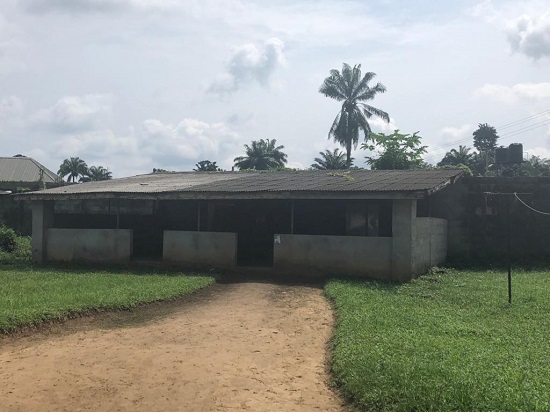
The school block where trainees are taught at Demak Clinic and Maternity, Ikot Ekpene
The State of the World’s Nursing 2020 published by the World Health Organisation (WHO) shows that as of 2018, Nigeria had less than ten registered nurses to cater to a population of 10,000 people, far below the 40 the global health body uses as a threshold although not as a recommendation.
While the current number of nurses could not be confirmed from the NMCN, the council told TheCable that Nigeria is “acutely short-staffed” in its nursing workforce. And that is where the problem lies.
A number of doctors and industry experts told TheCable that hospitals have taken undue advantage of the situation to employ those trained in the auxiliary programme, especially when they cannot afford to adequately pay the limited number of registered nurses available.
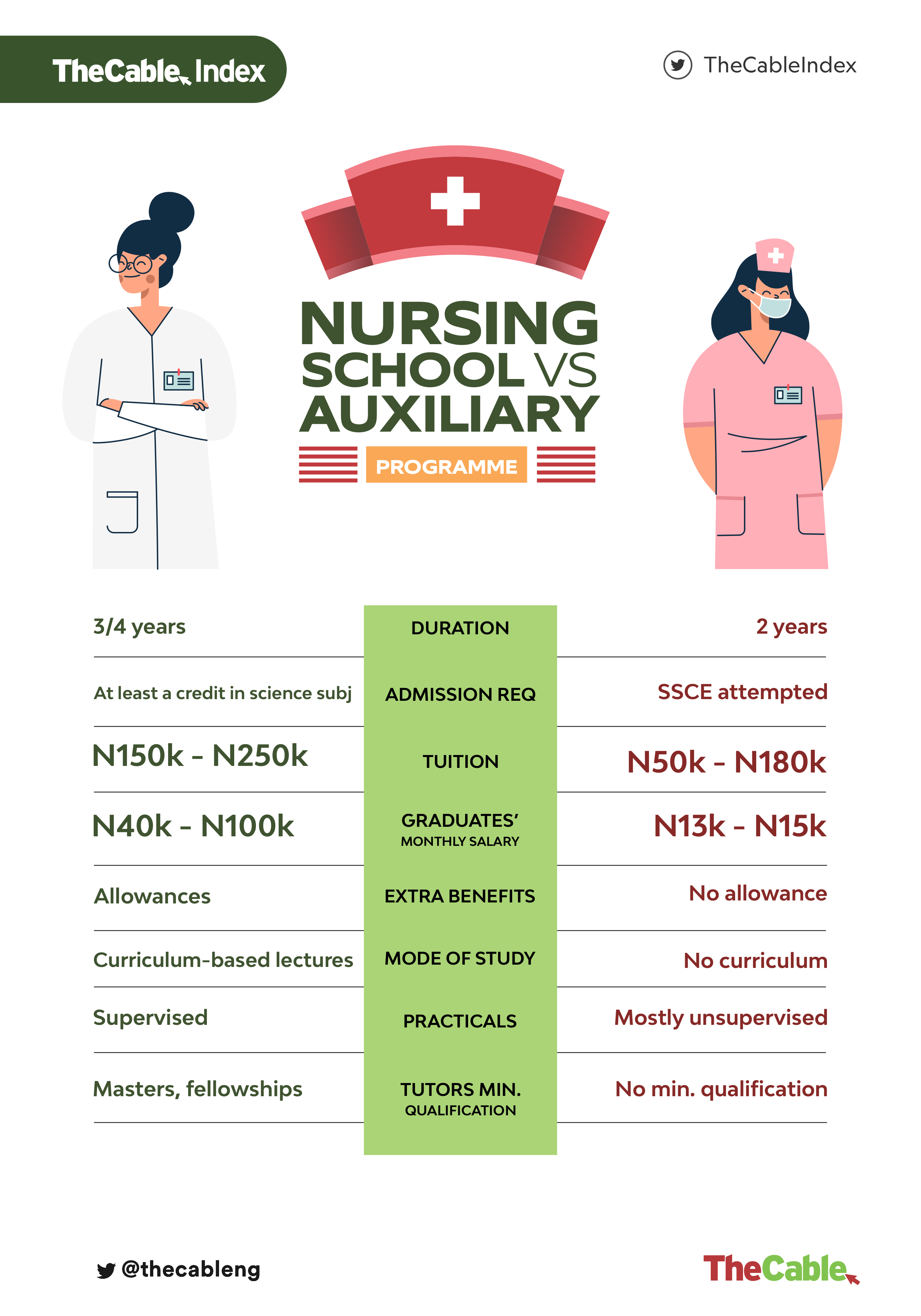
A nurse, who had a similar experience at a hospital in Port Harcourt, Rivers state, before she was forced to relocate to Ireland, told this reporter that among the 19 nurses at the health facility, “we were only two with qualifications and we were paid peanuts.”
“The rest were trained in the hospital by the owner and his wife,” the nurse simply identified as Frances said. She was, however, thankful that “it got me where I am today because I was obviously motivated to do my best to leave the toxic environment.”
Unfortunately, many others have also left like Frances, motivated by a system that seems to crush its best brains. As captured by Patricia Akpeh, head of the NMCN south-south zone, “even with Nigeria running short of nursing manpower, the foreign countries are still collecting the nurses (we have) because they are paying them better.”
On the way forward, Emem David, an official of the National Association of Nigerian Nurses and Midwives (NANNM), Akwa Ibom state council, said in addition to enforcing regulatory standards in the nursing profession, the government must also seek to adequately motivate nurses by improving their remuneration package “because so many people are ill-motivated”.














There are no comments at the moment, do you want to add one?
Write a comment